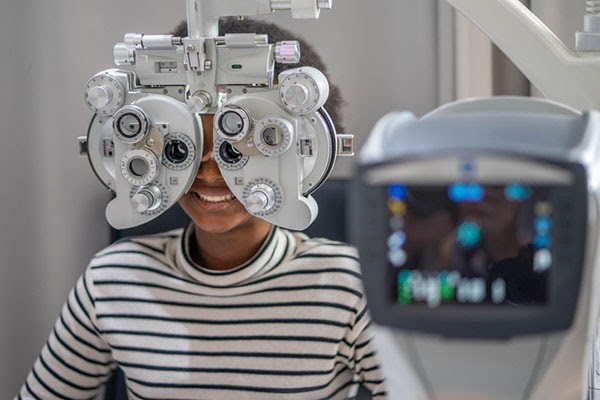
An eye exam is more than checking your vision to determine if corrective lenses are needed. Regular visits with an eye doctor are foundational to protecting your overall health.
Even if you don’t wear glasses or contact lenses, it’s important to maintain regular visits with an optometrist. There might be other health issues that are affecting your eyes.
As you learn more about the importance of eye exams, you will understand when and why you need to schedule an eye appointment. Our experienced team at EyesNY is here to provide full-service solutions, helping to protect your vision and more.
When an eye doctor looks into your eyes, they see a clear view of the inner areas of the eyes – including the blood vessels. The health of your eye circulation gives a clue about your general health.
Did you know that an eye exam can help with early identification of a variety of health conditions? For example, your eye doctor might notice signs of:
Regular eye exams increase the likelihood of catching these health conditions in the earliest stages. Then, you can work with your optometrist and other medical specialists to find the ideal treatment plan for your unique situation.
Early detection is key to prevent unnecessary complications in the future. A diagnosis points you in the right direction to make the lifestyle changes and medication decisions that help to control or stop the progression of the disease.
How often should you schedule an eye exam? It depends on your age and overall health. If you aren’t having any vision problems or symptoms, then this is the recommended schedule:
For adults who aren’t having any vision issues, these eye exams can be spread out a little more – depending on the doctor’s recommendations.
Keep in mind that most eye doctors recommend more frequent appointments for people with other health complications. For example, if your healthcare providers are monitoring serious diabetes or high blood pressure symptoms, then your eye doctor might want to see you as frequently as every 6 months.
While there are industry recommendations, each patient has unique needs. The best solution is to talk to your eye doctor to determine the ideal schedule for your checkups.
Pay attention if you are having problems focusing or you are experiencing blurry vision. Whether it is a sudden change in your vision, or it is a problem that comes and goes, you should talk to an eye doctor about your symptoms without delay.
Keep in mind that it’s normal for vision to change slowly with time – so there’s no need to panic. Your eye doctor can determine your new prescription to optimize your vision as much as possible.
It’s common for patients to be concerned if they notice spots or floaters in their line of vision. Typically, these symptoms are no cause for concern – they are caused by bits of tissue or protein in the vitreous part of the eye.
But floaters can also be an indication of a detached retina. If you experience a cloud of floaters, as well as swirly mists, flashes of light, or a sensation of having a curtain over part of the eye, then you should go to the ER or call your eye doctor immediately.
When a foreign object gets in your eye, it can cause serious pain and injury. You need immediate medical attention if you have anything in your eyes, such as dirt, chemicals, metal, glass, and more.
Don’t rub your eyes! Flush the eyes with cool, clean water right away – continue flushing for 15 minutes. If there is an object stuck in the eye, then you should visit an eye doctor without delay.
Malta
658 Malta Ave., Ste 101
Malta, NY 12020
Phone: (518) 580-0553
Saratoga Springs
414 Maple Ave Ste 200
Saratoga Springs, NY 12866
Phone: (518) 580-0553
Clifton Park
1712 U.S. 9
Clifton Park, NY 12065
Phone: (518) 580-0553
Queensbury
535 Bay Road
Queensbury, NY 12804
Phone: (518) 580-0553
Troy
2200 Burdett Street Ste 206
Troy, NY 12180
Phone: (518) 580-0553
